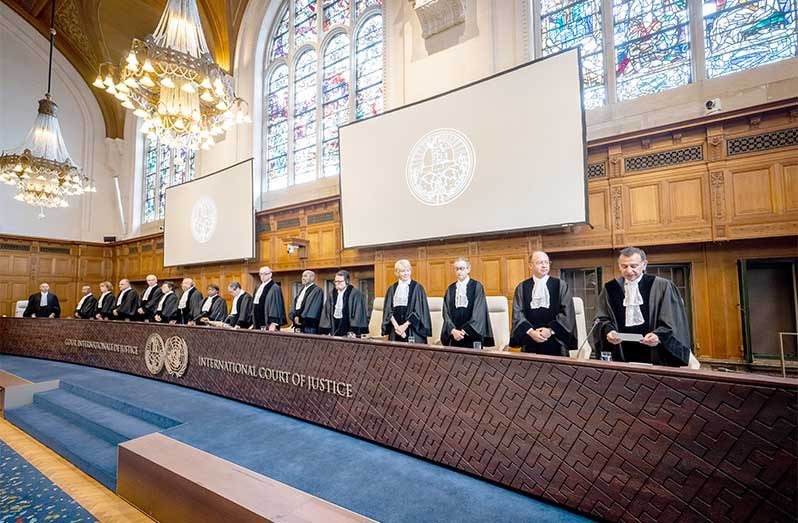–ICJ to schedule oral hearings
THE International Court of Justice (ICJ) has notified the Government of Guyana that Venezuela has filed its rejoinder in the ongoing case concerning the Arbitral Award of October 3, 1899.
The filing, made on Monday, August 11, 2025, comes within the deadline set by the court’s order of June 14, 2024. The rejoinder responds to Guyana’s reply, which was submitted in December 2024, and marks the conclusion of the written phase of the proceedings.
According to the Ministry of Foreign Affairs and International Cooperation, the ICJ will, upon its return from summer recess, schedule oral hearings on the merits of the case.
These hearings will be followed by the court’s deliberations and the delivery of its final judgment. The decision, once issued, will be binding on both Guyana and Venezuela under international law.
The Government of Guyana has welcomed Venezuela’s filing, stating that it ensures the court will have “all the factual and legal arguments of both parties” before rendering its judgment.
This, the government noted, will make the ruling “fully authoritative and incontestable.”
Guyana reaffirmed its commitment to resolving the long-standing border controversy peacefully and in accordance with international law.
The ministry emphasised that the matter is now in the hands of “the world’s highest and most respected judicial authority.”
The case before the ICJ concerns Venezuela’s contention that the 1899 Arbitral Award, which established the boundary between the two countries, is null and void. Guyana has maintained that the award is a valid and binding legal instrument that settled the border over a century ago.
In accordance with the Geneva Agreement, Guyana and Venezuela engaged in over two decades of Good Offices efforts on the border controversy under the United Nations’ (UN) Secretary-General’s auspices, in an attempt to find a peaceful diplomatic resolution.
However, on January 30, 2018, after the process failed to produce meaningful progress, the UN Secretary-General concluded that the Good Offices initiative had run its course.
In accordance with Article IV (2) of the Geneva Agreement, he exercised his authority and selected judicial settlement by the ICJ as the next method of resolution.
Guyana, in accordance with the Secretary-General’s decision, filed an application with the ICJ on March 29, 2018, seeking a ruling on the validity of the 1899 Arbitral Award and the boundary it established.
Venezuela, rather than cooperate, challenged the court’s jurisdiction, once again arguing that the Geneva Agreement did not allow for judicial proceedings.
After receiving extensive written submissions from both parties and holding oral hearings in June 2020, the court issued its judgment on jurisdiction on December 18, 2020.
The court found that: “Guyana and Venezuela mutually conferred upon the Secretary-General the authority to choose the means of settlement of the controversy, and on 30th January 2018, the Secretary-General exercised this authority by choosing judicial settlement before the Court.”
The court affirmed its jurisdiction to hear Guyana’s application regarding the validity of the Arbitral Award and the related issue of the definitive settlement of the land boundary controversy between Guyana and Venezuela.
Guyana has gained international backing, with CARICOM, The Commonwealth, the European Union (EU), the Organisation of American States (OAS), and other global partners reaffirming support for its position. They have condemned Venezuela’s recent aggression against Guyana’s sovereign territory, warning that it heightens tensions and jeopardises peace and stability across the region.



.jpg)









